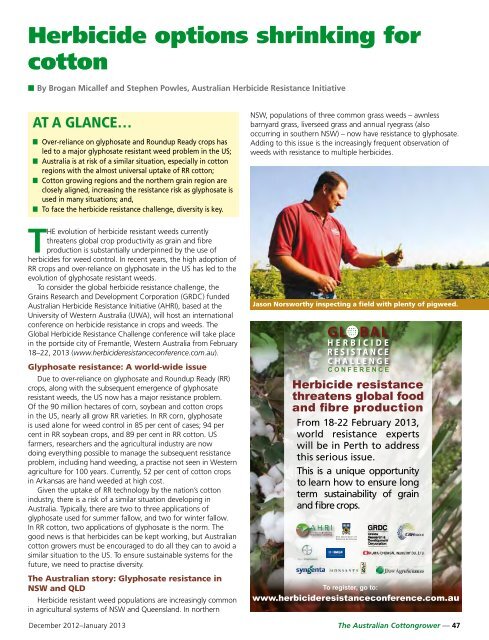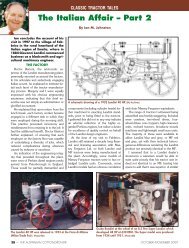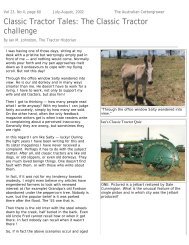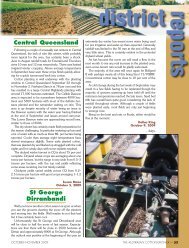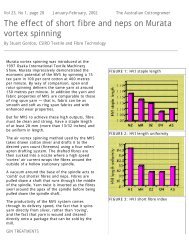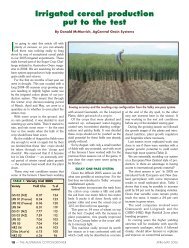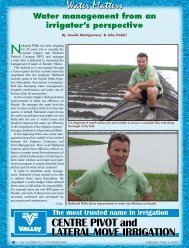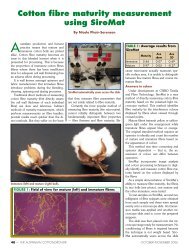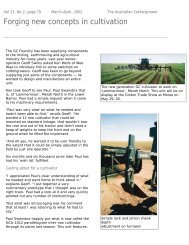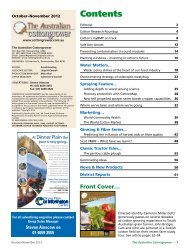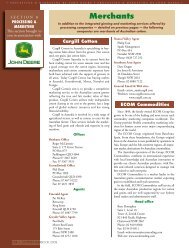cotton - Greenmount Press
cotton - Greenmount Press
cotton - Greenmount Press
You also want an ePaper? Increase the reach of your titles
YUMPU automatically turns print PDFs into web optimized ePapers that Google loves.
Herbicide options shrinking for<br />
<strong>cotton</strong><br />
■ By Brogan Micallef and Stephen Powles, Australian Herbicide Resistance Initiative<br />
AT A GLANCE…<br />
■ Over-reliance on glyphosate and Roundup Ready crops has<br />
led to a major glyphosate resistant weed problem in the US;<br />
■ Australia is at risk of a similar situation, especially in <strong>cotton</strong><br />
regions with the almost universal uptake of RR <strong>cotton</strong>;<br />
■ Cotton growing regions and the northern grain region are<br />
closely aligned, increasing the resistance risk as glyphosate is<br />
used in many situations; and,<br />
■ To face the herbicide resistance challenge, diversity is key.<br />
NSW, populations of three common grass weeds – awnless<br />
barnyard grass, liverseed grass and annual ryegrass (also<br />
occurring in southern NSW) – now have resistance to glyphosate.<br />
Adding to this issue is the increasingly frequent observation of<br />
weeds with resistance to multiple herbicides.<br />
THE evolution of herbicide resistant weeds currently<br />
threatens global crop productivity as grain and fibre<br />
production is substantially underpinned by the use of<br />
herbicides for weed control. In recent years, the high adoption of<br />
RR crops and over-reliance on glyphosate in the US has led to the<br />
evolution of glyphosate resistant weeds.<br />
To consider the global herbicide resistance challenge, the<br />
Grains Research and Development Corporation (GRDC) funded<br />
Australian Herbicide Resistance Initiative (AHRI), based at the<br />
University of Western Australia (UWA), will host an international<br />
conference on herbicide resistance in crops and weeds. The<br />
Global Herbicide Resistance Challenge conference will take place<br />
in the portside city of Fremantle, Western Australia from February<br />
18–22, 2013 (www.herbicideresistanceconference.com.au).<br />
Glyphosate resistance: A world-wide issue<br />
Due to over-reliance on glyphosate and Roundup Ready (RR)<br />
crops, along with the subsequent emergence of glyphosate<br />
resistant weeds, the US now has a major resistance problem.<br />
Of the 90 million hectares of corn, soybean and <strong>cotton</strong> crops<br />
in the US, nearly all grow RR varieties. In RR corn, glyphosate<br />
is used alone for weed control in 85 per cent of cases; 94 per<br />
cent in RR soybean crops, and 89 per cent in RR <strong>cotton</strong>. US<br />
farmers, researchers and the agricultural industry are now<br />
doing everything possible to manage the subsequent resistance<br />
problem, including hand weeding, a practise not seen in Western<br />
agriculture for 100 years. Currently, 52 per cent of <strong>cotton</strong> crops<br />
in Arkansas are hand weeded at high cost.<br />
Given the uptake of RR technology by the nation’s <strong>cotton</strong><br />
industry, there is a risk of a similar situation developing in<br />
Australia. Typically, there are two to three applications of<br />
glyphosate used for summer fallow, and two for winter fallow.<br />
In RR <strong>cotton</strong>, two applications of glyphosate is the norm. The<br />
good news is that herbicides can be kept working, but Australian<br />
<strong>cotton</strong> growers must be encouraged to do all they can to avoid a<br />
similar situation to the US. To ensure sustainable systems for the<br />
future, we need to practise diversity.<br />
The Australian story: Glyphosate resistance in<br />
NSW and QLD<br />
Herbicide resistant weed populations are increasingly common<br />
in agricultural systems of NSW and Queensland. In northern<br />
Jason Norsworthy inspecting a field with plenty of pigweed.<br />
C O N F E R E N C E<br />
Herbicide resistance<br />
threatens global food<br />
and fibre production<br />
From 18-22 February 2013,<br />
world resistance experts<br />
will be in Perth to address<br />
this serious issue.<br />
This is a unique opportunity<br />
to learn how to ensure long<br />
term sustainability of grain<br />
and fibre crops.<br />
To register, go to:<br />
www.herbicideresistanceconference.com.au<br />
December 2012–January 2013 The Australian Cottongrower — 47


